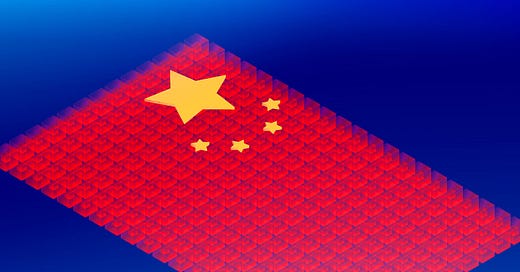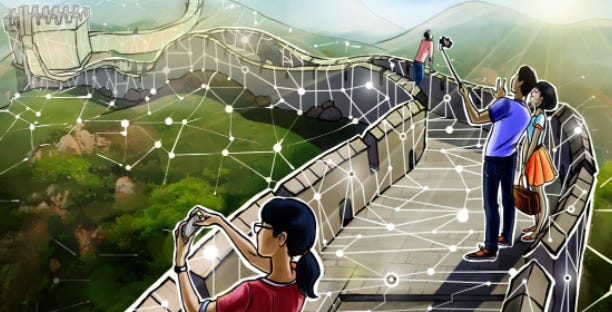What is Blockchain-based Service Network (BSN)?
The potential of BSN is a bit mysterious in 2022
Hey Guys,
China has been building a platform that aims to facilitate the deployment of blockchain technology for companies. It’s called Blockchain-based Service Network (BSN).
China’s commitment to blockchain is unlike most other countries. It appears in May, 2022 that China’s state-backed blockchain company is set to launch its first major international project.
China's National Blockchain
China has been quietly building a blockchain platform but it’s nothing like Dapps or crypto projects. It’s blockchain scalability sans the crypto, in a sense. In a speech in 2019, the Chinese leader said blockchain was an “important breakthrough in independent innovation of core technologies.” They have been working diligently on something and there’s starting to be more info about what that will be.
Just as China has been a first-mover in a CBDC, the Digital Yuan, the company called Blockchain-based Service Network (BSN), which has links to the Chinese government, will make the international version of its product open sourced to allow people to inspect the code and ensure there are no backdoors.
China’s National Blockchain is Not Crypto
BSN, which has links to the Chinese government, is aiming to go global and is yet another technological implementation of blockchain that is mysterious as it seems to be blockchain with Chinese characteristics.
In early 2022 China even said it will create its own NFT industry based on state-backed blockchain infrastructure, according to one of its main developers. BSN’s international product called the the Spartan Network will eventually be made up of half a dozen public blockchains that do no operate with cryptocurrencies.
While China bans cryptocurrency exchanges and initial coin offerings, the government is set to conduct various blockchain pilots on BSN. Just how complementary it will be to the Digital Yuan or what exactly it will offer remains to be seen.
Blockchain in the Cloud
I think it’s pretty fascinating since China has shown it can build companies or even super-apps at scale. Blockchain-based Service Network (BSN) bills itself as a “one-stop shop” to deploy blockchain applications in the cloud, a process that could otherwise be costly and time consuming. It aims to link different blockchains together to help businesses deploy the technology.
In April 2020, the Chinese government launched the Blockchain-based Service Network (BSN – 区块链服务网络), which is defined on its website as “common infrastructure for the deployment and operation of blockchain applications globally.” Just two years later it seems to be making some progress. That it is from China’s Government yet using blockchain is so very peculiar to how we’ve come to view distributed ledger technology.
China has a way of re-inventing things and utilizing technologies and artificial intelligence according to its own needs, standards and design preferences. While in the west Bitcoin’s popularity has created a craze of speculation and potential DeFi implications for Web3, China’s approach bears some watching. Hong Kong-headquartered start-up Red Date Technology is one of the founding members of BSN.
Blockchain Beyond Cryptocurrencies
BSN’s blockchain networks, however, do not operate with any cryptocurrencies because China has cracked down on digital coins in September, 2021. China is seeking to unlock the fundamental business benefits of the technology to help scale other businesses. Proponents of blockchain technology say that it can reduce the cost and increase the speed of some business processes.
China’s approach to blockchain seems to be more in line with the 4th industrial revolution, smart cities and building business networks in the cloud in a harmonious order. For instance, The BSN’s stated goal “is to lower the cost barrier of blockchain technologies to anyone” enabling “blockchains with millions of dapps, all deployed, managed, and interoperable on the BSN.” (“Dapps” are decentralized apps that run on blockchain.) You have got to admire China’s intentions to scale blockchain for all.
Although Beijing has banned cryptocurrencies, I think we will find it is quite serious about blockchain and allowing China to be a leader in the Metaverse, if not quite the sorts of things we commonly associate with Web3 in the cryptocurrency sense all tethered to Bitcoin’s price or Ethereum’s ecosystem.
BSN’s Momentum for Chinese Blockchain
For the last three years I can imagine BSN has had some pretty incredible funding if you think about it. In a speech in 2019, the Chinese leader said blockchain was an “important breakthrough in independent innovation of core technologies.” As a result of that speech, blockchain was elevated to a national priority for China, among other technologies — such as semiconductors — that the country is trying to boost its capabilities in.
What is the Spartan Network?
The Spartan Network will eventually be made up of half a dozen public blockchains that do not operate with cryptocurrencies. One of those will be a non-crypto version of the Ethereum blockchain when the project launches in August, 2022. It is not clear to me exactly how a non-crypto version of Ethereum could function.
It appears it could use a stablecoin tethered to the price of the U.S. dollar instead. Blockchain transactions usually cost money. But Red Date Technology CEO Yifan He said that the fee will be paid in U.S. dollars rather than Ethereum’s related cryptocurrency called ether.
China also wants to become a world leader of the new technology. However it is doing things according to its own vision of what blockchain does well and how it could actually scale. It’s unclear what the incentives for foreign companies to becoming part of BSN are or will be.
“The purpose of this is to drop the cost to use public chains to very minimal so that more traditional IT [information technology] systems and business systems can use public chains as part of their systems”
If China is successful, the Spartan Network will help blockchain be scalable globally for businesses.
Blockchain first came to prominence as the underlying technology of the cryptocurrency bitcoin. It is a distributed ledger of activity that records transactions on the bitcoin network.
It is decentralized and no single entity owns or runs it. That the Chinese Government wants to run a global blockchain for commerce and scalable public chains is unusual and perhaps forward-thinking. China’s implementation of the Digital Yuan we must recall is years ahead of other companies and their respective central banks.
The Blockchain Based Service Network (BSN). A cross-cloud, cross-portal, and cross-framework global public infrastructure network used to deploy and operate all types of blockchain distributed applications (DApps).
My intuition tells me that China could use BSN to create blockchain in the cloud services that could be first-class thus giving them some kind of a global competitive advantage as the network gets bigger.
Can Blockchain Thrive without Crypto Tokens?
The Red Date Technology CEO admitted that not having cryptocurrencies as part of the company’s product offering is a challenge. He said BSN Spartan Network will be “difficult to push in the first or second year because most people in the blockchain industry only understand crypto.”
The company is backed by the State Information Center (SIC) which sits under China’s powerful National Development and Reform Commission (NDRC). China Mobile, a state-owned telecommunications company also appears to be a significant player behind the project.
So whatever BSN becomes or offers will be part of some kind of Chinese masterplan. Distributed ledger technologies deservers many manifestations and just as A.I. with Chinese characteristics has advanced facial recognition and social credit systems, China can implement DLT in its own unique and valuable way.
BSN Spartan will be open source and seek to draw in global partners. It will thus integrate not only blockchain tech but some of the ideology in DeFi and Dapp communities, it just wont’ utilize cryptocurrencies or the same tokenomics in the process. It remains to be seen how its version will be better, or how exactly it will be different.
BSN Will Position Itself as a Cloud Alternative to Azure, AWS and Google Cloud for Blockchain As a Service Infrastructure
The BSN will offer cutting-edge networking infrastructure, including for digital payments, cloud computing, and communications, among other services, nearly free for developers and entrepreneurs.
For a few hundred dollars per year, developers can obtain services from the BSN that would cost tens of thousands of dollars from private firms like Amazon Web Services or Microsoft’s Azure. In a sense China sees distributed ledger technology as a way to leap-frog the American Cloud first-mover advantage, if I understand what I am reading correctly.
The BSN is governed by the BSN Development Association (区块链服务网络发展联盟), which is led by the State Information Center (国家信息中心, SIC), a government think tank under the National Development and Reform Commission. As such, this entity appears to come from the very highest levels of Chinese internet authorities.
BSN is Nearly Five Years in the Making
Other key associated entities include the state-owned China Mobile telecommunications firm and the payments firm China UnionPay, both of which are listed as launch organizations on the BSN’s homepage. Red Date Technology, a Chinese start-up headquartered in Hong Kong, is the BSN’s technical architect. The three companies reportedly drafted the plan to build the BSN as early as September 2018 before reaching out to the SIC for collaboration.
The Goal of the Blockchain Service Network
According to the BSN User Manual the BSN is a worldwide infrastructure network that provides developers and companies a “one-stop-shop solution for blockchain and distributed ledger technology (DLT) applications (DApp),” interoperable within one uniform environment.
Here I think we can just say that this is a Blockchain with Chinese characteristics. Like Huawei is able to offer lower costs, so will the BSN take this strategy to empower foreign companies to develop on its network.
Advent of the Blockchain-Cloud Layer
The manual also describes the BSN as a complex system that involves programming, software development, resource and environment configurations, application deployment, gateway APIs, local SDKs, key certificates, etc.
While Alibaba, Baidu, Huawei, Tencent and others are decent, they are nowhere in the same class in 2022 as Azure, AWS, Google Cloud and others. I am wondering if BSN can level the playing field for global companies that might become over-time more attracted to BSN?
The truth is we don’t yet know exactly the kind of scale BSN might reach. Fudan University Professor Michael Sung framed BSN as infrastructure for interconnectivity throughout the country and along the “Digital Silk Road,” offering inexpensive access to blockchain connections. Center for a New American Security scholar Yaya Fanusie argued in testimony before the U.S.–China Economic and Security Review Commission (USCC) that BSN sought to provide infrastructure for new internet applications that would operate on data shared by various parties in real time.
Clearly China is well positioned to offer scalability of blockchain’s future as currently the crypto tokenized version of blockchain isn’t really reaching mainstream maturity in any useful way due to scalability bottlenecks as we have seen with pre Ethereum 2.0.
A New Operating System for Blockchain Adoption and Dapps
BSN, wants to act as an operating system for blockchain programs so developers won’t have to design a framework from the ground up. Importantly, it’s part of the China’s technology goal to set industry standards and build the underlying infrastructure for blockchain applications worldwide.
China’s ability to build for the long-game really I think will be pivotal in how it establishes itself as the new Super power. So BSN is likely just another pillar of how it seeks to do that, where BSN is a long-term, generational project with a timeline of 10-plus years. It’s more than just a company or a single approach to blockchain. It’s China’s internet projecting itself into the future where DLT adoption will be much higher as the cost reduces and facilitates enormous benefits.
What is the Importance of Red Date Technology?
The brains behind BNS are the State Information Center, an affiliate to China’s top economic and reform planner, the country’s credit card processing giant UnionPay, telecoms carrier China Mobile and a little-known Beijing-based startup called Red Date, which cut its teeth building smart city technology in China.
Red Date is the architect of the BSN, China's ambitious state-backed blockchain initiative aiming to establish an internet-like network for blockchain applications. Red Date has also launched its own blockchain projects, independent of the BSN.
China might position Red Date Technology to be the ByteDance of the blockchain world. They only raised $30 million about one year ago, but what can they become?
BSN is a Smart City Approach to Blockchain Adoption
Fudan’s Sung has argued that as envisioned, blockchain infrastructure would feed other widely promoted efforts to build a “smart” society through smart cities, connecting encrypted databases linked by 5G to scalable cloud and data management infrastructure in a way that is framed as not feasible with the current decentralized and insufficiently secure systems.
This is very much in line with China’s ambition to become the 4th Industrial Era leader in smart technologies broadly speaking.
With fewer than 200 employees, mostly engineers, Beijing-based Red Date Technology is building the Blockchain Services Network, an architecture that it hopes will be the underlying infrastructure for a new blockchain-based internet. Executives from Saudi Aramco and early FTX backer Kenetic Capital saw something early in them too.
A round led by early-stage venture capital firm Kenetic Capital and Prosperity7, the diversified venture fund of state oil giant Saudi Aramco. Bangkok Bank and Swiss financial services giant Pictet Group also participated in the round that took place in June, 2021.
Red Date CEO Yifan He appears to be the only official spokesperson of BSN. He is a somewhat mysterious character in how this plays out.
While LinkedIn shut down LinkedIn China, I was perplexed to see his Beijing LinkedIn account still sharing things on BSN. Microsoft like Apple or Tesla, it appears have complex relationships with China.
He believes in 10 years, all clouds will have a standard blockchain environment to handle all blockchain-related applications. These environments link together to form a new layer on the Internet for broadcasting communications and public IT systems (including blockchains). Also, non-crypto blockchains will become more and more critical for businesses in the future, and we are prepared to launch non-crypto public chains in the BSN's international offerings.
After two years of development of the BSN International, I am excited to announce our very first in-person international conference, The BSN Hong Kong Summit, will be held in Hong Kong on May 24th, 2022. The summit is co-hosted by BSN Development Association, Financial Services Development Council, China Mobile Hong Kong, and Red Date (Hong Kong) Technology.
It is a hybrid event presented both live in-person and live digitally.
Finally to read the white paper I recommend you to go here.
Anyways guys I hope you found it interesting. Whatever prejudices we have about China, that they are technologically ambitious and able to scale projects is becoming a lot more clear in the 2020s.
From “common prosperity” to regulating tech companies to protecting consumers and citizens (e.g. children and gaming), many of their ideas and intentions appear sound to me. It’s important to keep an open mind not just about what China is today but what it will become.
If you want to support the channel, you can do so here.








